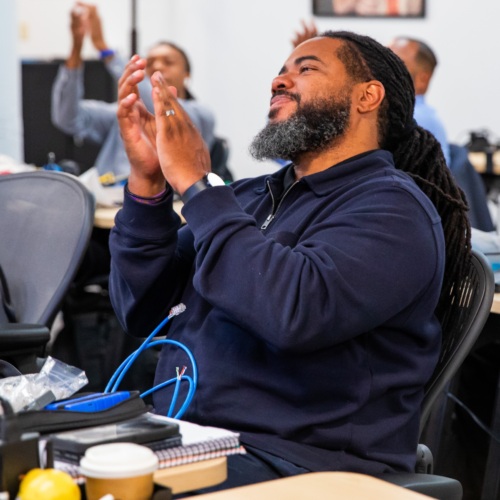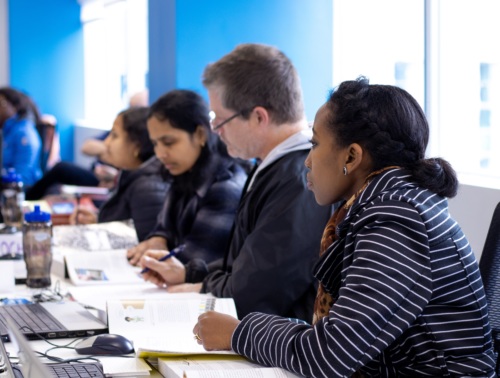
Clear Connections
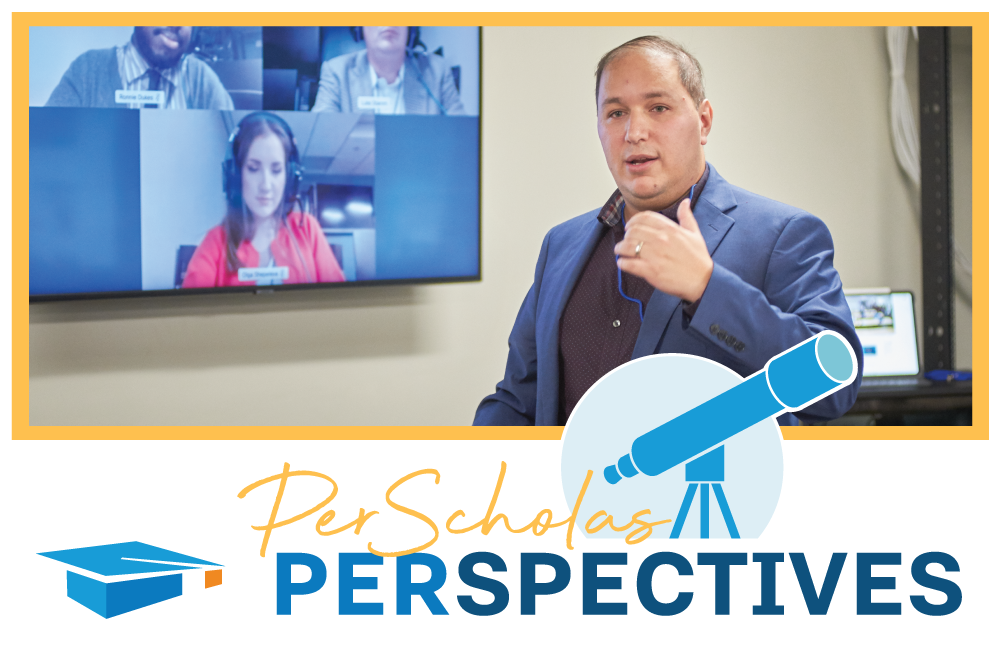
Clear Connections
by Eduardo Hernandez
Senior Vice President, Training Quality, Tech and Innovation
Like so many, my world was turned upside down in March 2020 at the onset of what would become the COVID-19 global pandemic. I had to navigate a move for my parents, and remote schooling for my daughter, while grappling with the uncertainty of Covid 19.
Professionally, as the VP of Technology and Training Innovation at the time for national tech skills trainer Per Scholas, I had a lot to worry about. There were more than 500 learners enrolled in active courses in more than 30 classrooms in cities across the nation, from Dallas to Greater Boston and beyond. Like all other institutions, we shut our physical doors, but had an obligation to our learners to keep courses going. Remote learning was at our doorstep, and we innovated and tried our very best to keep training going.
We didn’t really know whether our migration to remote learning would be successful. Yes, we had been testing some hybrid models pre-pandemic, and were set to pilot them in February 2020, just before the pandemic hit. Our intensive 12 to 15 week boot-camp style training experience is not easy, even when learners can practice hands-on skills in modern computer labs stocked with best-in-class hardware and software. It was difficult for my team to imagine how learners could master all the training material in remote classes, especially given the distractions learners faced at home. Plus, the majority of our learners didn’t have adequate technology at home, from laptops to broadband. Complications abounded.
“We had no idea how learners might fare in a 100 percent remote framework, only that we had no other options,” reflected Per Scholas President and CEO Plinio Ayala. “But we also knew that we had been presented with an unusual opportunity to explore the capabilities and limits of remote learning in ways we had scarcely imagined would ever be possible.”
Informed Innovation
Prior to COVID, Per Scholas had accumulated high-quality research evidence demonstrating the long-term efficacy of our training. We are one of very few workforce development organizations that has undergone two randomized control trial impact evaluations. These comprehensive, multi-year studies generated robust proof that our pre-COVID-19 career preparation model raised income, reduced use of TANF, SNAP, and unemployment insurance benefits and increased overall life satisfaction.
But in mid-March 2020, we needed a 100% remote training model that we could implement within two weeks. There would be no time to evaluate it beforehand. Instead, we had to learn as we went, remaining flexible and innovating at all costs. So we did our best to build in a robust feedback loop, leveraging learnings in real time to build program model strengths and address challenges.
From our first week of our migration to remote learning, my staff adapted and administered multiple surveys to generate organized feedback from remote learners and faculty members and used those learnings to adjust our approach in real time. Just eight weeks into the next experience, we switched to a different video communications platform, began to vary the learning activities scheduled for each day, provided assistance for learners who lacked adequate technology, and developed supports for instructors who initially struggled to adjust to remote training delivery. These early changes fostered immediate improvements in learner engagement and outcomes, but also highlighted the need for Per Scholas to continue learning from our experience.
Teaming up with Barrow Street Consulting
Accordingly, once our trainings had begun to stabilize again, we teamed up with our friends at Barrow Street Consulting (BSC) to lead a sustained remote learning evaluation effort. BSC had two overarching questions we asked them to look at: First, how learners and staff experiencing the sudden transition to remote learning and subsequent rapid program changes, and second, how remote learning outcomes changed over time.
With a mix of mid- and end-point course surveys and focus groups, BSC research revealed that remote learning at Per Scholas was achieving graduation and certification outcomes that closely aligned the organization’s pre-COVID-19 norms but had not yet equaled them as we neared the end of 2020. So, we innovated and created a centralized, national Remote Training Team, essentially creating a virtual campus that would eventually be led by a managing director.
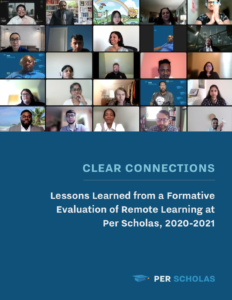
One year later, BSC repeated its collection and analysis of implementation data and began studying outcomes for the remote learners we had enrolled to date. It had found significant improvements in graduation, certification, and job attainment between 2020 and early 2021. Plus, since we were open to making changes and implementing modifications we believed would benefit our learners, those in the 2021 cohorts expressed greater satisfaction with Per Scholas than those in 2020 cohorts. Our remote offering was working!
Keys To Success: Equitable Access, Instructional Excellence, and Learner Support
I believe there are three keys to our success: ensuring equitable access to remote learning, a strong focus on instructional excellence, and providing a wide range of new learner supports. The overwhelming majority of Per Scholas learners come from households with incomes lower than the median in their respective region. We quickly learned that a significant share of learners lacked minimum technology requirements of training from home. Our team was quick to raise funds to close this digital divide and in 2021 provided hundreds of technology kits to our learners to ensure success. Eighty-five percent of learners reported that the tech kits made their course material easier to understand. Ensuring every single learner enrolled in training had the tools they needed to succeed from home was essential as we ensured equitable access.
Another challenge we faced early on was from our faculty – technical instructors, career developers, and instructional associates. Suddenly they were being asked to teach curriculum from home, not the state-of-the-art classrooms they were used to while also navigating new responsibilities like caring for young children and their families at home. When the pandemic first began, our faculty in all three categories struggled with the new format. Over time, Per Scholas provided professional development, home-based technology, and many other supports to bridge the gap. According to analysis by BSC, 100 percent of responding instructors and career coaches reported that they had improved remote instruction and the majority “to a great extent.” Our focus on instructional excellence remains.
The third key area of focus for Per Scholas during this transition to remote learning was Learner Support. COVID-19 greatly increased the number of learners confronting psychosocial, health, and economic challenges to a significant degree. Before the pandemic, we provided these types of services at our New York City campuses including dedicated learner support managers and financial coaches. Other campuses often partnered with community-based organizations to address learners’ needs. Understanding the strain that COVID-19 had, Per Scholas quickly realized we needed to nationalize our learner supports for all Per Scholas learners to be able to access. Our organization quickly stood up robust remote learner support services, including individualized learner counseling, referrals, benefits advocacy, and financial coaching. Since March 2020, our Learner Support Team has logged thousands of meaningful encounters with hundreds of Per Scholas learners. Today, the team’s national reach and enhanced capabilities are permitting us to consider implementing even more comprehensive learner supports in the future.
Remote Learning is Here to Stay
Per Scholas initially conceived a remote learning model as a temporary response to an extraordinary circumstance, but it has been abundantly clear that we’ll continue to train in both on-campus and remote learning settings. A large majority of our potential learners prefer it. But in order to do so, we need funders and policymakers to provide funding and resources for adult education and training providers to continue evolving and improving remote programs; support formative, participant-centered evaluations, like the kind BSC conducted for Per Scholas; and to provide additional supports for programs to remove access barriers affecting remote learners. Plus, professional development for educators is key. Many teachers and instructors experienced a jarring shift to remote instruction, and Per Scholas found that an expectation of simply flipping the switch wasn’t going to be sustainable.
For our part, Per Scholas is committed to evolving our remote learning model, including variations like hybrid – meaning some in-person and some at-home instruction as well as leveraging our powerful Satellite Model of training individuals closer to their homes. In my role as Senior Vice President of Training, Quality, Tech, and Innovation, I welcome the opportunity to continue the conversation about our successes and challenges and to create a community of practice with other providers to enhance our abilities to train our learners in remote settings.
Sign up for our Monthly Impact Report
More News
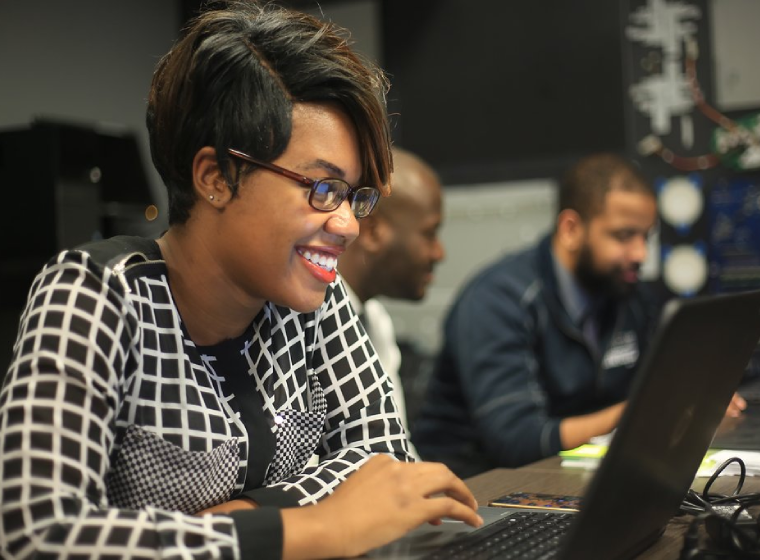
Donate Now
Your support makes a powerful difference in our ability to build a technology talent training solution that creates greater access and equity.

